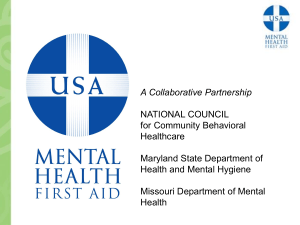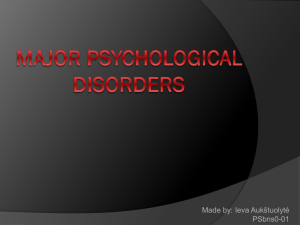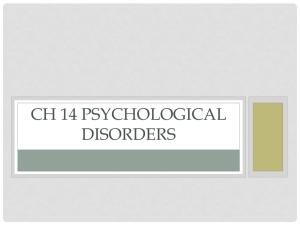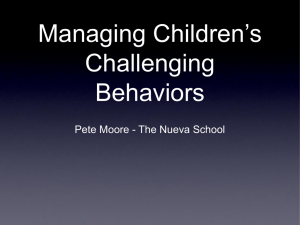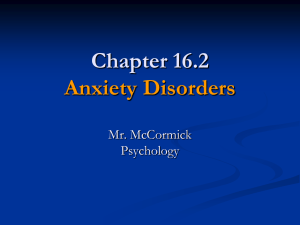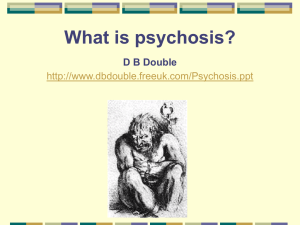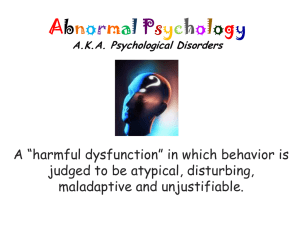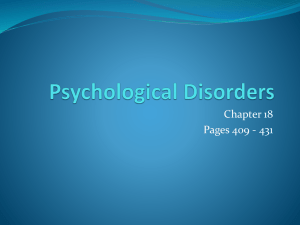Abnormal Behavior
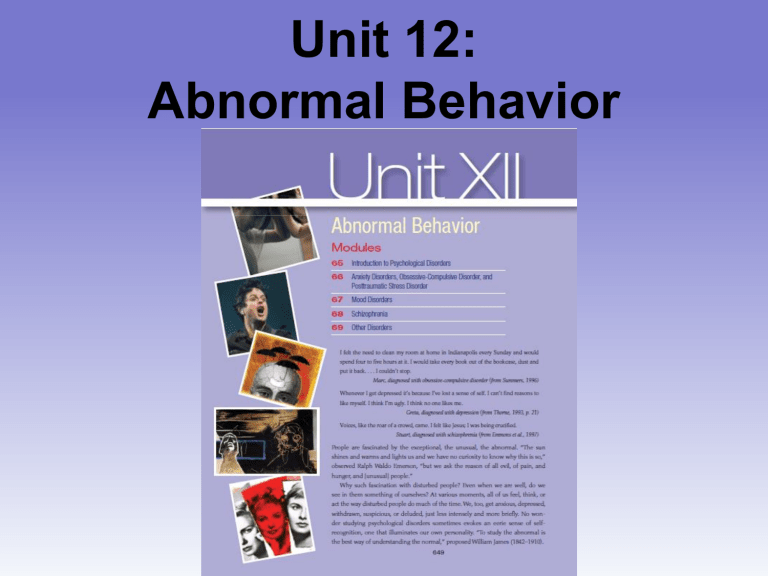
Unit 12:
Abnormal Behavior
Unit 12 - Overview
• Introduction to Psychological Disorders
• Anxiety Disorders, Obsessive-Compulsive
Disorder, and Posttraumatic Stress
Click on the any of the above hyperlinks to go to that section in the presentation.
Module 65:
Introduction to Psychological
Disorders
Introduction
• How should we define psychological disorders?
• How should we understand disorders?
• How should we classify psychological disorders?
Defining Psychological
Disorders
Defining Psychological
Disorders
• Psychological disorders
–Disturbed behavior
–Dysfunctional behavior
–Maladaptive behavior
• Attention deficit hyperactivity disorder
(ADHD)
Understanding Psychological
Disorders
Understanding Psychological Disorders
The Medical Model
• Philippe Pinel
• Medical model
–Mental illness (psychopathology)
Understanding Psychological Disorders
The Biopsychosocial Approach
• Interaction of nature and nurture
• Influence of culture on disorders
Classifying Psychological
Disorders
Classifying Psychological
Disorders
• Diagnostic and Statistical Manual of Mental Disorders (DSM)
– DSM-5
• Diagnostic labels
• Criticisms of the DSM
Labeling Psychological
Disorders
Labeling Psychological
Disorders
• Rosenhan’s study
• Power of labels
–Preconception can stigmatize
• Stereotypes of the mentally ill
• Insanity
Rates of Psychological
Disorders
Rates of Psychological
Disorders
Module 66:
Anxiety Disorders, Obsessive-
Compulsive Disorder, and
Posttraumatic Stress Disorder
Anxiety Disorders
• Anxiety disorder
– Generalized anxiety disorder
– Panic disorders
– Phobias
Generalized Anxiety Disorder
Generalized Anxiety Disorder
• Generalized anxiety disorder
–2/3 women
–Continual worry, jittery, agitated and sleep deprived
–Free floating anxiety
Panic Disorder
Panic Disorder
• Panic disorder
–Panic attacks
Phobias
Specific Phobia
• Phobias
–Specific phobia
– Social anxiety disorder
– Agoraphobia
Phobias
Obsessive-Compulsive and
Related Disorders
Obsessive-Compulsive
Disorder
• Obsessive-compulsive disorder
–An obsession versus a compulsion
–Checkers
–Hand washers
Obsessive-Compulsive
Disorder
Trauma Stressor and Related
Disorders
Posttraumatic Stress Disorder
• Post-traumatic stress disorder
–PTSD
–“shellshock” or “battle fatigue”
–Not just due to a war situation
• Post-traumatic growth
Understanding Anxiety
Disorders, OCD and PTSD
Understanding Anxiety Disorders, OCD and PTSD
The Learning Perspective
• Classical and operant conditioning
–Stimulus generalization
–Reinforcement
• Observational learning
• Cognition
Understanding Anxiety Disorders, OCD and PTSD
The Biological Perspective
• Natural selection
• Genes
–Anxiety gene
–Glutamate
• The Brain
–Anterior cingulate cortex
Module 67:
Depressive and Bipolar Disorders
Depressive Disorders
Major Depressive Disorder
• Major depressive disorder
–Problems regulating appetite
–Problems regulating sleep
–Low energy
–Low self-esteem
–Difficulty concentrating and making decisions
–Feelings of hopelessness
• Persistent depressive disorder
Bipolar and Related Disorders
Bipolar Disorder
• Bipolar Disorder
– Mania (manic)
• Overtalkative, overactive, elated, little need for sleep, etc.
–Disruptive Mood Dysregulation Disorder
–Bipolar disorder and creativity
Understanding Depressive and Bipolar Disorders
Understanding Depressive and Bipolar Disorders
• Many behavioral and cognitive changes accompany depression
• Depression is widespread
• Women’s risk of major depression is nearly double men ’s
• Most major depressive episodes self-terminate
• Stressful events related to work, marriage and close relationships often proceed depression
• With each new generation, depression is striking earlier and affecting more people
Understanding Depressive and Bipolar Disorders
Understanding Depressive and Bipolar Disorders
The Biological Perspective
• Genetic Influences
–Mood disorders run in families
• Heritability
• Linkage analysis
• The depressed brain
• Biochemical influences
–Norepinephrine and serotonin
Understanding Depressive and Bipolar Disorders
The Biological Perspective
Understanding Depressive and Bipolar Disorders
The Social-Cognitive
Perspective
• Negative Thoughts and Moods Interact
–Self-defeating beliefs
• Learned helplessness
• Rumination
–Explanatory style
• Stable, global, internal explanations
–Cause versus indictor of depression?
Understanding Depressive and Bipolar Disorders
The Social-Cognitive Perspective:
Depression ’s Vicious Cycle
Module 68:
Schizophrenia Spectrum
Symptoms of Schizophrenia
Symptoms of Schizophrenia
• Schizophrenia (split mind)
–Not multiple personalities
– Psychosis
(psychotic disorder)
Symptoms of Schizophrenia
Disorganized Thinking and
Disturbed Perceptions
• Disorganized thinking
– Delusions
• Delusions of persecution (paranoid)
–Word Salad
– Hallucinations
–Breakdown in selective attention
Symptoms of Schizophrenia
Diminished and Inappropriate
Emotions
• Inappropriate Emotions
–Flat affect
• Inappropriate Actions
–Catatonia
–Disruptive social behavior
Onset and Development of
Schizophrenia
Onset and Development of
Schizophrenia
• Statistics on schizophrenia
• Onset of the disease
• Positive versus negative symptoms
• Chronic (process) schizophrenia
• Acute (reactive) schizophrenia
Understanding Schizophrenia
Understanding Schizophrenia
Brain Abnormalities:
Dopamine Overactivity
• Dopamine Overactivity
–Dopamine – D4 dopamine receptor
–Dopamine blocking drugs
• Glutamate
Understanding Schizophrenia
Brain Abnormalities:
Abnormal Brain Activity and Anatomy
• Abnormal Brain Activity and Anatomy
–Frontal lobe and core brain activity
–Fluid filled areas of the brain
Understanding Schizophrenia
Brain Abnormalities:
Maternal Virus During Midpregnancy
• Maternal Virus During Pregnancy
–Studies on maternal activity and schizophrenia
–Influence of the flu during pregnancy
Understanding Schizophrenia
Genetic Factors
• Genetic predisposition
• Twin studies
Understanding Schizophrenia
Psychological Factors
• Possible warning signs
– Mother severely schizophrenic
– Birth complications (low weight/oxygen deprivation)
– Separation from parents
– Short attention span
– Disruptive or withdrawn behavior
– Emotional unpredictability
– Poor peer relations and solo play
Module 69:
Other Disorders
Somatic Symptom and Related
Disorders
Somatic Symptom and Related
Disorders
• Somatic symptom disorder
–Somatic (body)
– Conversion disorder
• Functional neurological symptom disorder
– Illness anxiety disorder
• Hypochondriasis
Dissociative Disorders
Dissociative Disorders
• Dissociative disorders
–Fugue state
–Dissociate (become separated)
Dissociative Disorders
Dissociative Identity Disorder
• Dissociative identity disorder (DID)
–Multiple personality disorder
Dissociative Disorders
Understanding Dissociative
Identity Disorder
• Genuine disorder or not?
• DID rates
• Therapist’s creation
• Differences are too great
• DID and other disorders
Feeding and Eating Disorders
Feeding and Eating Disorders
• Eating disorders
– Anorexia nervosa
– Bulimia nervosa
– Binge
-eating disorder
Personality Disorders
Personality Disorders
• Personality disorders
–Cluster A
• Schizoid personality disorder
–Cluster B
• Histrionic personality disorder
• Narcissistic personality disorder
• Antisocial personality disorder
–Cluster C
• Avoidant personality disorder
Personality Disorders
Antisocial Personality Disorder
• Antisocial personality disorder
–Sociopath or psychopath
• Understanding antisocial personality disorder

